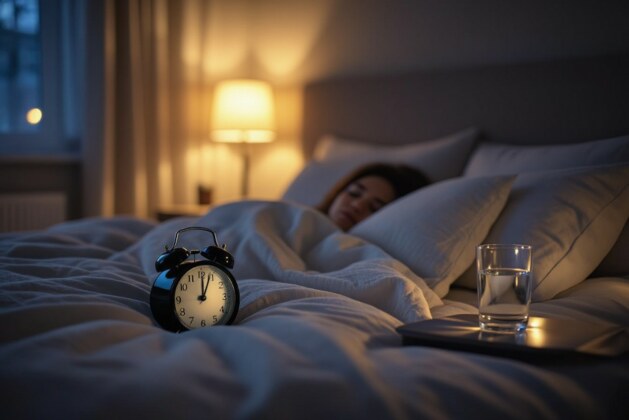Health is a phenomenon I have always found fascinating, especially when considering the profound impact of sleep on your body and mind. I want you to realize that without adequate sleep, your brain’s ability to process information and your body’s capacity to repair itself are severely compromised, leading to significant risks such as weakened immunity and cognitive decline. Conversely, sufficient rest unlocks remarkable benefits, enhancing memory, creativity, and overall well-being. In this guide, I will unravel the science behind why sleep is not just a state of inactivity but a vital pillar of human survival and flourishing.

The Biological Imperative of Sleep
Sleep acts as a fundamental biological rhythm that orchestrates countless physiological processes important for survival. During sleep, your brain and body transition through complex phases that regulate metabolism, hormone production, and neural connectivity. Evolution has preserved this cycle because it enhances cognitive function, emotional regulation, and physical health. Disruptions in sleep patterns can lead to impairments as severe as increased risk of chronic diseases such as diabetes, cardiovascular issues, and neurodegenerative disorders. This deep integration underscores sleep not merely as rest but as a vital, active process indispensable to life itself.
Sleep’s Role in Cellular Repair and Regeneration
While you sleep, your body initiates extensive cellular repair and regeneration efforts that are indispensable for maintaining tissue integrity. Growth hormone secretion surges during deep sleep, spurring protein synthesis and cellular renewal. This process repairs damage from oxidative stress and daily wear, particularly in muscles, skin, and neural tissues. Without adequate sleep, these repair mechanisms slow down, leaving your cells vulnerable to accelerated aging and dysfunction. This ongoing restoration supports not just recovery but also primes your body to resist future stressors efficiently.
The Connection Between Sleep and Immune Function
During sleep, your immune system enhances the production of protective cytokines and antibodies, vital for defending against infections. Studies reveal that people sleeping less than six hours have a significantly higher susceptibility to illnesses like the common cold. Sleep deprivation dampens the activity of natural killer cells, which are frontline defenders against viral invaders. This immunological boost is not only about combating disease but also about maintaining immune system balance, preventing overreactions that can lead to autoimmune disorders.
Delving deeper, sleep’s impact on immune health encompasses the regulation of inflammatory responses and the facilitation of immunological memory. For example, during slow-wave sleep, communication between T cells and antigen-presenting cells is optimized, improving the body’s ability to recognize and remember pathogens. Conversely, persistent sleep loss elevates systemic inflammation markers such as C-reactive protein, correlating with increased risks of chronic inflammatory conditions. This subtle orchestration illustrates why prolonged sleep inadequacy can undermine both acute infection defense and long-term immune resilience.

Mental Resilience: The Sleep-Mood Nexus
Sleep profoundly shapes your mental resilience, acting as a biological reset button that refreshes your emotional circuits. Without adequate rest, your brain’s ability to process stress, manage fear, and maintain optimism falters dramatically. In a study by the University of Pennsylvania, just one week of restricted sleep led to a 60% increase in emotional reactivity. This delicate interplay means insufficient sleep doesn’t just tire your body but can unravel the fine balance of your mental health, leaving you more vulnerable to anxiety and mood disorders.
How Sleep Influences Emotional Regulation
The connection between sleep and emotional regulation hinges on the prefrontal cortex’s interaction with the amygdala, the brain’s fear center. With restful sleep, your prefrontal cortex dampens the amygdala’s exaggeration of negative stimuli, effectively stabilizing your mood. Depriving yourself triggers a hyperactive amygdala response, increasing emotional volatility by up to 60%, making daily stresses feel overwhelming. This disruption can impair decision-making and escalate frustration, illustrating why a good night’s sleep acts like an emotional governor, keeping your reactions measured and rational.
The Sleep-Depression Link: A Two-Way Street
Sleep disturbances and depression share a bidirectional relationship, each exacerbating the other in a self-perpetuating cycle. Insomnia or fragmented sleep increases the risk of developing depression by nearly 40%, while depressive symptoms often manifest as chronic sleep disruptions. This cyclical link means that unaddressed sleep problems can both signal and amplify depressive episodes, complicating treatment outcomes and recovery trajectories.
Delving deeper, research shows that alterations in REM sleep patterns—specifically shortened REM latency and increased REM density—are consistently observed in depressed patients. These changes may impair the brain’s overnight emotional recalibration processes, reinforcing negative mood states. Additionally, inflammatory markers elevated by poor sleep further contribute to neurochemical imbalances associated with depression. Understanding this reciprocal mechanism highlights why therapeutic strategies targeting sleep improvement can significantly alleviate depressive symptoms, breaking the vicious cycle.

Cognitive Performance: Sleep’s Impact on Intelligence and Creativity
Throughout my research, I’ve seen how sleep acts as a vital mental reset, enhancing problem-solving abilities and creative thinking. Sleep deprivation, even for one night, reduces your cognitive performance by up to 40%. Adequate rest reshapes neural connections, supporting fluid intelligence—the capacity for logical thinking and pattern recognition. When I examine the brain’s activity during sleep, especially in deep stages, it’s evident how your mind actively reorganizes and integrates information, fueling innovations and intellectual sharpness.
Memory Consolidation: The Night Shift of the Brain
I find it remarkable that during sleep, particularly slow-wave sleep, your brain consolidates memories by transferring them from the hippocampus to long-term storage in the cortex. This process strengthens neural pathways, making recall more reliable. Studies show that sleep after learning can improve retention by as much as 20%, which reveals how vital it is to let your brain do its nightly housekeeping rather than pushing it into exhaustion.
The Role of REM Sleep in Problem-Solving
Rapid Eye Movement (REM) sleep, often called the brain’s workshop, facilitates creative problem-solving and emotional processing. This sleep phase promotes the formation of new associations across distant ideas, enabling insights that awake thinking rarely achieves. Researchers have observed a 35% increase in creative task performance following REM-rich sleep cycles, highlighting how your dreams might be quietly working through waking challenges.
Diving deeper into REM sleep, I’ve encountered experiments where participants solved complex puzzles more effectively after REM phases. Unlike other sleep stages that focus on memory stabilization, REM triggers a neural landscape where seemingly unrelated memories interweave, fostering novel solutions. This stage also activates the prefrontal cortex differently, bringing flexibility and openness to your thoughts that drive breakthroughs in artistic and scientific endeavors alike.
The Economic and Social Costs of Sleep Deprivation
Sleep deprivation silently drains economies worldwide, with the Global Economic Burden of Insufficient Sleep estimated at over $400 billion annually in the U.S. alone. This drain plays out through increased healthcare expenses, lower work output, and higher accident rates. Societies pay in reduced quality of life, where families bear emotional tolls from sleep-related conditions. The ripple effects extend into community safety and societal productivity, showing how personal rest connects tightly to collective well-being.
Productivity Loss: Sleep as a Silent Tax
Insufficient sleep downright cripples workplace efficiency, leading to a staggering productivity loss of billions of dollars each year. Studies link chronic fatigue to slower cognitive processing, impaired decision-making, and higher error rates, costing businesses in delayed projects and increased accidents. You can think of these losses as a silent tax on the economy, where every sleep hour sacrificed translates into diminished innovation and output.
The Broader Impact on Public Health Systems
Sleep deprivation inflates the demand on public health systems through heightened occurrences of chronic diseases like diabetes, cardiovascular issues, and mental health disorders. Hospitals face increasing patient loads directly tied to poor sleep, straining resources and escalating costs. Healthcare expenditures related to sleep disorders climb significantly each year, emphasizing how unmanaged sleep problems morph into expensive public health challenges.
Diving deeper, the chronic conditions fueled by inadequate rest compound over time, forcing public health providers to allocate funds not only for immediate treatment but long-term care. Emergency visits due to sleep-related accidents, such as car crashes or workplace injuries, surge during periods of population-wide sleep deficiency. Furthermore, mental health services are increasingly demanded to tackle anxiety and depression exacerbated by poor sleep quality. I find it striking how this chain reaction magnifies the pressure on healthcare infrastructure, urging policymakers to prioritize sleep health as an integral part of disease prevention and health promotion strategies.
Practical Strategies for Enhancing Sleep Quality
Optimizing your sleep quality extends beyond just the number of hours spent in bed; it hinges on deliberate choices that synchronize your body with its natural rhythms. Tailoring your evening routine, maximizing the restorative stages of sleep, and minimizing disruptions can collectively uplift your overall health. Implementing targeted strategies often yields improvements in cognitive function, mood stability, and physical recovery.
Creating a Sleep-Conducive Environment
Your bedroom’s atmosphere directly influences your sleep depth and ease of falling asleep. A temperature between 60-67°F (15-19°C) encourages melatonin production, while eliminating blue light exposure from screens one hour before bed significantly benefits circadian alignment. Employing blackout curtains and reducing ambient noise through white noise machines or earplugs can further fortify your sleep sanctuary, allowing uninterrupted passage through the crucial REM and deep sleep cycles.
The Science of Sleep Hygiene: What Works and What Doesn’t
Many embrace sleep hygiene principles, but their efficacy varies widely. Consistency in bedtime and wake time strengthens the circadian rhythm, yet reliance on excessive napping often fragments nocturnal sleep. Some popular tips, like reading on screens or drinking alcohol to relax, paradoxically hinder deep sleep stages. Methods supported by controlled studies include limiting caffeine intake after 2 pm and ensuring exposure to morning sunlight, both of which anchor your internal clock more securely.
Diving deeper, the science reveals that practices like sleep restriction therapy—temporarily reducing time in bed—and stimulus control therapy outperform common but less effective habits. For example, associating the bed strictly with sleep prevents conditioned arousal. Conversely, prolonged use of sleep aids or unregulated technology use before bedtime can disrupt sleep architecture and diminish restorative sleep time. Hence, adopting evidence-backed behaviors rather than anecdotal routines can markedly improve your sleep quality and, by extension, your overall well-being.
Summing up
The profound significance of sleep lies in its ability to refine your cognitive functions and sustain your biological systems. I have observed that during rest, your brain consolidates memories and recalibrates neural pathways, enhancing learning and problem-solving. Without adequate sleep, your perception and decision-making falter, undermining the very essence of your conscious experience. I urge you to value sleep not as a mere pause but as an active, restorative process imperative for your intellectual and physical vitality, fostering a harmony between your mind and body that propels your existence forward.





Leave a comment